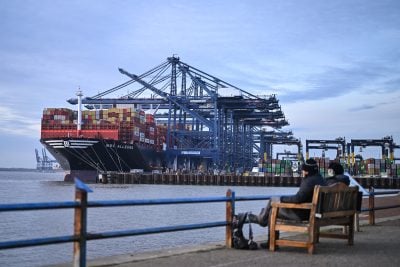With its references to multi-year economic plans, working committees and tributes to departed comrades, South Africa’s State of the Nation address often resembles a statement from the old Soviet Politburo.
But against the backdrop of a deepening economic crisis, President Jacob Zuma injected February’s solemn speech with an unusually forthright message – South Africa is still open for business.
For the country’s increasingly pessimistic commercial class, struggling amid a prolonged period of stunted growth and policy uncertainty, it will take more than Zuma’s honeyed words to reassert confidence. In particular, many have been spooked by the botched introduction of a controversial legal framework – the Protection of Investment Act – which they fear raises the unwelcome spectre of nationalisation and state expropriation.
“I think it’s fair to say [the Act] has not been received particularly well by a number of foreign investors who have raised concerns – whether justified or not is a different question,” says Jeffrey Kron, head of corporate and commercial litigation at law firm Norton Rose Fulbright in Johannesburg.
The contentious act, which has been approved by both houses of Parliament and President Zuma, is intended as a replacement for the raft of bilateral investment treaties (BITs) first introduced by Nelson Mandela’s government as post-apartheid South Africa reconnected with global capital flows during the 1990s.
As various factions of the ANC squabbled over the benefits of western capitalism versus a Soviet-style command economy, the BITs offered investors a sweetener – an option of international arbitration to settle future disputes with the government. No longer would the security of investments be decided on a whim by populist politicians – foreign legal experts would have the final say. That all changed in 2013, when the government decided to scrap BITs agreed with several European partners.
Under the new act, some investors say the protections afforded by the BITs, crucial in wooing investors from Europe and beyond, have been watered down just as South Africa needs to encourage scarce investment flows. According to UNCTAD’s most recent Global Investment Trends monitor, foreign direct investment (FDI) into South Africa fell 74% to $1.5bn over the course of 2015.
“European Union investors are particularly vexed by it…The bill adds significant uncertainty around the discretion government has in the disputes process, which has not been clarified, and it appears disputes will now, versus under BITs, be more protected and possibly biased in favour of government,” says Peter Attard Montalto, South Africa analyst at investment bank Nomura.
That view is given short shrift by Zuma’s government, which insists that countries including Canada, Australia, India and Brazil have all launched similar reviews of their BITs. In a statement, the Department of Trade and Industry argued that the BITs leave the government “unnecessarily” open to arbitration – and vulnerable to millions of rands in unjust fines. The Department says that the new bill will offer investors the strongest possible protection in line with both international norms and the South African constitution.
Nevertheless, analysts remain concerned that the new bill is part of a confused policy agenda which leaves the government incapable of effectively communicating its goals and reassuring concerned investors.
“The investment law itself is exactly in line with international investment norms, but it’s the various other pieces of legislation and statements by the government which all together are becoming worrisome for investors,” says Robert Besseling, executive director at business risk consultancy EXX Africa.
Fears of nationalisation
Few industries in South Africa are as historically fraught and politically explosive as mining and commercial farming. Closely associated with the injustices of apartheid and the power of white monopoly capital, the sectors are frequently invoked by radicals as potential targets for state expropriation.
The ANC’s revered 1955 Freedom Charter, which calls for the land and “the minerals beneath the soil” to enter common ownership, provides a potent rallying cry for Julius Malema’s Economic Freedom Fighters – the hard-line political party insisting on a far tougher settlement with investors.
While Besseling says that the Protection of Investment Act alone will not change the status quo for these sectors, he argues that it could open the way for more contentious pieces of legislation to enter the statute books. “There are various other bills which are waiting for this Investment Bill to be finalised. It’s essentially these bills…that are increasing the risk for foreign investors of expropriation,” he says.
Those bills include the long-gestating Mineral and Petroleum Resources Development Act, which envisages an initial 20% stake for government in new oil and gas investments, and the Expropriation Act, which raises the possibility of expropriating land in the ‘public interest’. Critics of the act, including the conservative Institute of Race Relations, argue that it will empower the government to seize farmland while leaving previous owners mired in costly litigation.
Kron concedes that there are uncertainties for investors under the Expropriation Act.
“In terms of the act there will be definitions of expropriation and how the government can expropriate including when it is in the public interest to do so. That is a broad categorisation and to that extent it may advance the possibility of interference with business and the protection of investments.”
Disputes arising in these sectors could be among the first to be tackled by the controversial new arbitration process under the Protection of Investment Act. Nevertheless, analysts caution that a total overhaul of government policy towards nationalisation remains a remote prospect.
“I think a hard-headed businessman will see the Investment Bill for what it is, I don’t think such a person would be overly concerned by it,” says Kron.
“I believe the government understands the dangers and difficulties of nationalisation, I don’t think it believes that it will not, on expropriation, be liable to compensation. Our government is still pragmatic and understands the risks,” he continues.
Yet with investors hardly desperate to invest in a troubled South Africa, Montalto says that there is a pressing need for the government to explain itself and review how it introduces contentious new legislation.
“The issue is that [the BITs] lapsed without a replacement, then the replacement was mismanaged and poorly drafted, and then further delayed without consultation.”
David Thomas
Want to continue reading? Subscribe today.
You've read all your free articles for this month! Subscribe now to enjoy full access to our content.
Digital Monthly
£8.00 / month
Receive full unlimited access to our articles, opinions, podcasts and more.
Digital Yearly
£70.00 / year
Our best value offer - save £26 and gain access to all of our digital content for an entire year!

 Sign in with Google
Sign in with Google 


